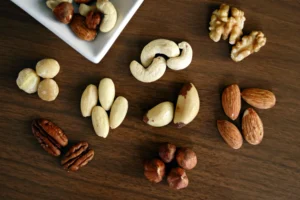Generated by Contentify AI

Introduction
Understanding the Role of Fiber in Weight Loss
In today’s health-conscious society, the role of fiber in weight loss has garnered significant attention. Fiber, a crucial component of a balanced diet, plays a pivotal role in promoting weight loss and overall well-being. By understanding the impact of fiber on the body, individuals can make informed decisions to achieve their weight loss goals successfully.
Fiber, found abundantly in fruits, vegetables, whole grains, and legumes, offers numerous health benefits. When it comes to weight loss, fiber’s primary role lies in promoting satiety and controlling appetite. Foods rich in fiber take longer to chew and digest, leading to a feeling of fullness and reduced calorie intake. As a result, individuals are less likely to overeat and indulge in unhealthy snacking, thus aiding in weight management.
Moreover, fiber aids in regulating blood sugar levels, which is crucial for managing weight. By slowing down the absorption of sugar, fiber helps prevent sudden spikes and crashes in blood sugar levels, thereby reducing cravings for sugary and high-calorie foods. This, in turn, contributes to better weight control and improved energy levels throughout the day.
Furthermore, the digestive benefits of fiber are integral to weight loss. High-fiber foods promote healthy digestion, prevent bloating, and support gut health, all of which are essential for a successful weight loss journey. A healthy digestive system ensures that the body efficiently absorbs nutrients and eliminates waste, allowing for optimal metabolic function and overall well-being.
Incorporating an adequate amount of fiber into the diet is crucial for sustainable weight loss. However, it’s essential to gradually increase fiber intake to allow the body to adjust and avoid digestive discomfort. Additionally, staying hydrated is key, as fiber absorbs water and aids in promoting regularity and preventing constipation.
In conclusion, understanding the multifaceted role of fiber in weight loss is essential for anyone striving to achieve and maintain a healthy weight. By embracing a diet rich in fiber, individuals can experience greater satiety, improved digestive health, and better control over their appetite and weight. With this knowledge, individuals are empowered to make informed dietary choices that support their weight loss journey and overall well-being.
The Role of Fiber in Weight Loss
Fiber plays a crucial role in weight loss by promoting feelings of fullness and aiding in digestion. It can also help regulate blood sugar levels and prevent overeating. By adding high-fiber foods to your diet, you can effectively manage your weight and improve your overall health. Additionally, fiber-rich foods are often lower in calories, making them an excellent choice for those looking to shed some extra pounds. Incorporating fiber into your meals is a smart and effective strategy for achieving sustainable weight loss. Keep in mind that increasing fiber intake should be done gradually to avoid digestive discomfort.
What is Fiber and Why is it Important?
Fiber is an essential component of a balanced diet and plays a crucial role in weight loss. It is a type of carbohydrate that the body cannot digest, making it important for digestion and overall health. Fiber helps regulate the digestive system, promoting regular bowel movements and preventing constipation. Additionally, consuming fiber-rich foods can help you feel full for longer periods, which can aid in reducing overall calorie intake. This can be particularly beneficial for individuals looking to lose weight, as it can support satiety and reduce the likelihood of overeating. Overall, incorporating fiber into your diet is a smart and effective choice for those aiming to achieve weight loss goals while maintaining good digestive health.
The Impact of Fiber on Weight Management
In the “Understanding the Role of Fiber in Weight Loss” blog section, we delve into the impact of fiber on weight management. Fiber is a crucial element in a balanced diet, playing a significant role in promoting feelings of fullness and satiety. By incorporating fiber-rich foods into your meals, you can better control your appetite and ultimately support your weight management efforts. Furthermore, the digestive benefits of fiber contribute to a healthier gut, which in turn can positively impact overall well-being and weight management. With its numerous benefits, fiber is undoubtedly a valuable asset in the pursuit of achieving and sustaining a healthy weight.
Sources of High-Fiber Foods
Understanding the role of fiber in weight loss is essential for anyone looking to achieve their health and wellness goals. One of the key elements of this understanding is identifying sources of high-fiber foods. Including a variety of high-fiber foods in your diet not only supports digestive health but also aids in weight management.
High-fiber foods such as fruits, vegetables, whole grains, legumes, and nuts are not only nutritious but also contribute to a feeling of fullness, which can aid in controlling overall calorie intake. By incorporating these foods into your daily meals, you can create a well-rounded and satisfying diet that supports your weight loss journey.
Consuming high-fiber foods can also have a positive impact on your metabolism and blood sugar levels, making it an essential component of a healthy eating plan. Furthermore, the regular consumption of high-fiber foods can support a healthy gut microbiome, which has been linked to various aspects of overall health.
In conclusion, prioritizing high-fiber foods is a smart and effective strategy for anyone aiming to lose weight and improve their overall well-being. By understanding the role of fiber in weight loss and choosing the right sources of high-fiber foods, you can set yourself up for success on your health and wellness journey.
How to Incorporate More Fiber into Your Diet
Incorporating more fiber into your diet is a crucial step in the journey towards achieving your weight loss goals. Fiber not only aids in digestion and keeps you feeling fuller for longer, but it also contributes to overall health and well-being. By focusing on increasing your fiber intake, you can effectively manage your weight and improve your overall health. In this section, we will explore various creative and delicious ways to incorporate more fiber into your daily diet, helping you to achieve your weight loss objectives while indulging in a diverse and satisfying meal plan.
Maximizing the Benefits of Fiber for Weight Loss
Maximizing the benefits of fiber for weight loss is a crucial factor in understanding the role of fiber in weight loss. Fiber plays a pivotal role in promoting weight loss as it contributes to a feeling of fullness and helps in controlling overall calorie intake. It also aids in regulating blood sugar levels and promoting digestive health. By incorporating high-fiber foods such as fruits, vegetables, whole grains, and legumes into your diet, you can effectively manage your weight and improve your overall health. Understanding the significance of fiber in weight loss empowers individuals to make informed dietary choices and achieve sustainable, long-term weight management goals.
Conclusion
The conclusion section of Understanding the Role of Fiber in Weight Loss is a culmination of the evidence and information presented in the blog. It is here that we can appreciate the significance of fiber in achieving weight loss goals. By emphasizing the role of fiber in promoting satiety, regulating blood sugar levels, and supporting a healthy digestive system, we underscore the importance of incorporating fiber-rich foods into a balanced diet. Ultimately, the conclusion serves as a reminder of the actionable steps individuals can take to harness the benefits of fiber in their weight loss journey, providing a sense of empowerment and encouragement for the readers to make informed dietary choices.






